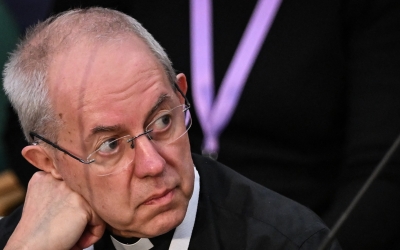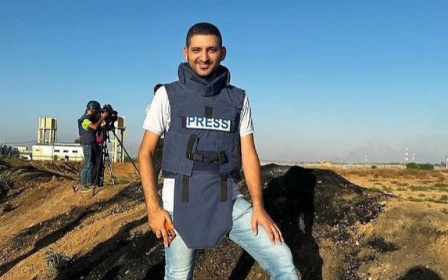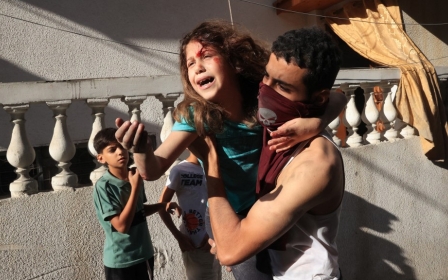Israel-Palestine war: Turkey asked Hamas' leadership to leave the country, sources say

Turkey asked Hamas’ top leadership to leave the country on the day that hundreds of Palestinian fighters attacked Israeli communities near the Gaza Strip, several sources told Middle East Eye.
All of Hamas’ senior leaders in Turkey have since left the country after being asked to, two sources familiar with the issue said.
On Sunday, Al Monitor reported that Hamas' political leader Ismail Haniyeh and his entourage were “politely sent away” after footage circulated on social media of him giving prayers of thanks while watching the attack on TV in Istanbul.
It wasn’t immediately clear whether Khaled Meshaal is still in Turkey. Meshaal was head of Hamas’ political bureau until he was succeeded by Haniyeh in 2017, and is seen as a figurehead, not an official leader.
Last week he gave an in-person interview to Haberturk TV, apparently from within Turkey.
New MEE newsletter: Jerusalem Dispatch
Sign up to get the latest insights and analysis on Israel-Palestine, alongside Turkey Unpacked and other MEE newsletters
The presence of Hamas leaders in Turkey has long been a contentious issue and a target of Israeli anger.
However, many of them were sent to Turkey by Israel as part of the 2011 Gilad Shalit prisoner exchange. Other senior Hamas leaders are based in Qatar, Lebanon and Gaza.
An Israeli source said they were trying to verify whether or not Hamas officials had left Turkey.
“If that is so, it will be seen as a very favourable act by Israel. Though officials in Israel would emphasise the need to do it long ago,” the source added.
One source told MEE that all Turkish engagements with the Hamas leadership were conducted over the phone, so senior officials weren't in Turkey in the first place.
Follow Middle East Eye's live coverage for the latest on the Israel-Palestine war
A second source said that Hamas leaders did not stay in Turkey permanently, spending time in the country depending on talks, conferences and other events they attended there and abroad.
A third source with knowledge of the situation said Turkey may not have wanted to be seen hosting Hamas leaders on a day that the Palestinian movement led an attack that killed around 1,400 Israelis, the majority of them civilians, including children.
“The optics of it would have been damaging,” the source said.
However, a Palestinian source in Istanbul with knowledge about Hamas and its internal affairs told MEE: "There is a distortion. It is true that most of the Hamas officials went to Qatar. But they were not expelled from Turkey. Their purpose of leaving was to participate in the hostage negotiations in Qatar and Hamas meetings."
Shifting rhetoric
Since the Palestinian attack, Israel has relentlessly bombed the Gaza Strip, killing more than 5,000 Palestinians.
Though Turkish President Recep Tayyip Erdogan stuck with a balanced tone in the first days of the conflict, he later began to use much heavier rhetoric against Israel as the death toll rose sharply in Gaza.
Earlier this week, Erdogan called on Israel to stop its operations in Gaza, which he said amounted to “a genocide”.
The Turkish presidency denied in an Arabic post on X, formerly Twitter, that Turkey had asked Hamas leaders to leave the country.

Erdogan’s ruling Justice and Development Party (AKP) also said that the president would attend a pro-Palestine rally in Istanbul on Sunday.
Turkey says it is actively involved in attempting to free the 222 Israelis taken captive by Palestinian fighters on 7 October. Hamas says they are being held across the Gaza Strip.
Last week, Turkish Foreign Minister Hakan Fidan said “many countries” had asked for Turkey’s help freeing the captives, many of whom are dual citizens of several western countries. Two US-Israeli captives have so far been freed by Hamas.
Relations between Israel and Turkey have been frosty for years, but improved late last year with the two exchanging ambassadors.
Ties between the two first soured in 2011 when Turkey expelled Israel's ambassador after a UN report into Israel's raid on the Mavi Marmara aid ship to Gaza in 2010, which killed nine Turkish citizens.
The rift was healed in 2016, when full diplomatic relations were restored and ambassadors were exchanged.
However, tensions were renewed in 2018 when Israeli forces killed scores of Palestinians taking part in the Great March of Return protests in Gaza. The protesters demanded the implementation of refugees' right of return and an end to the crippling siege on Gaza.
Last week, Israel withdrew all its diplomats from Turkey, citing security concerns.
Additional reporting by Yusuf Selman Inanc
Middle East Eye delivers independent and unrivalled coverage and analysis of the Middle East, North Africa and beyond. To learn more about republishing this content and the associated fees, please fill out this form. More about MEE can be found here.




